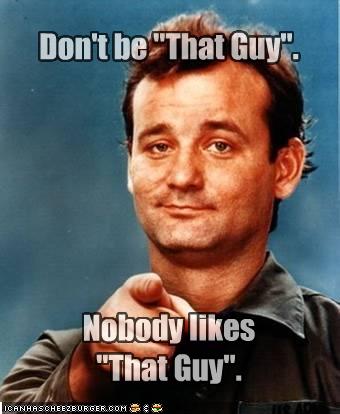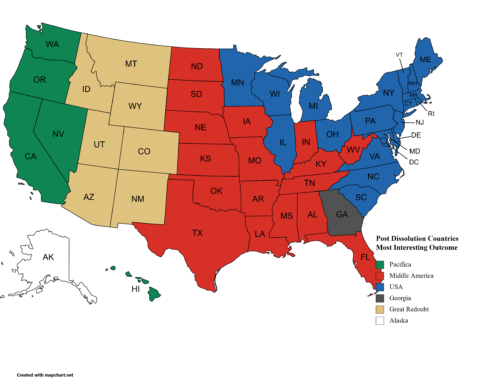Sorry to say, but if you are, you don’t know it, and most likely nobody is going to tell you. But there’s hope. You can turn it around. Really.
The New York Times piece “How To Keep Your Office Holiday Party From Going Off The Rails” is a good place to start. “Getting on top of the boss’s desk and dancing — not a good idea,” John A. Challenger, chief executive of the outplacement consulting firm Challenger, Gray & Christmas, said in an interview. “Making a pass at the C.E.O.’s spouse — not a good idea. These sorts of things have happened and given the H.R. teams great headaches.” For those who ask themselves what the problem is with dancing ont he desk, you might be “that guy.”
In all seriousness, I would say that if you are That Guy, it likely isn’t entirely your fault. There was a time not long ago when societal norms were such that everyone knew the bounds and it was almost impossible to find That Guy in the business world. But over the last 3 decades the United states has seen a change in societal norms where people are offended if individuals or society try to hold them accountable for actions. That may or may not be fine with you. I’m not here to argue that with you. I am here to say that in the business world, those norms still exist and are fully enforced, either overtly by code or by a common if unspoken understanding.
Its fine for you to say and believe that nobody should be able to tell you what to wear or that you shouldn’t smoke certain substances. But the life reality is that individuals and businesses DO judge and have a very sound reason to. Certain outward signals and behaviors are clues to the individual’s fit in the culture of the firm. And there is no amount of you saying “no fair” when the company says, “thanks for applying, but we found a better fit.”
You can argue that you have a right to do what you want in your own time, but if your social media page shows pictures of you at parties with the slogan “4:20 all day”, you shouldn’t wonder why the HR manager doesn’t call you back for an interview.
As the NYT article states: “Remember, what happens at the party does not necessarily stay at the party. With the proliferation of smartphones and social media, there are more ways than ever to document and share bad behavior, which can permanently damage your reputation.” Just because you haven’t been caught yet or killed doing something “cool” on video, doesn’t mean it is good for your future. Back in the days before videos, you could recover from a really dumb mistake. Today, rather than helping someone not do something dumb, almost everyone whips out their phones to video the event for posting to the internet forever.
How do you know if you’re That Guy? If you’re like Ned in this commercial, you might be That Guy. That Guy is concerned about himself and doesn’t care what anyone else thinks. Anything he does to upset others is their own problem and something they’ll just have to deal with.
So how do you go from being That Guy to something better? First, make a commitment to not be him any more.
Go to the Art of Manliness and read up on being smooth and manly. There are lots of very practical and deeply important topics there to help you on your journey. Just a couple are the importance of being on time and the importance of having a routine.
Second, get out of your life cocoon. Go to some places you’ve never been and challenge yourself to see things in a different light. Try some new foods you’ve never had, even if it means going to a restaurant and ordering something completely different. Mark Twain wrote in his book Innocents Abroad: ‘Travel is fatal to prejudice, bigotry, and narrow-mindedness, and many of our people need it sorely on these accounts. Broad, wholesome, charitable views of men and things cannot be acquired by vegetating in one little corner of the earth all one’s lifetime.’
Third, make some friends. Real friends based on give, not just take. G.K. Chesterton said “Only friendliness produces friendship. And we must look far deeper into the soul of man for the thing that produces friendliness.” That takes effort, but it is tremendous antidote to That Guy-ness.
One of the greatest things that’ll happen to you when you’re no longer That Guy is that good men and women, ordinary people as well as people of influence and character, will notice and will begin to give you the benefit of the doubt simply because of your effort to change.
Keep thinking…






Leave A Comment